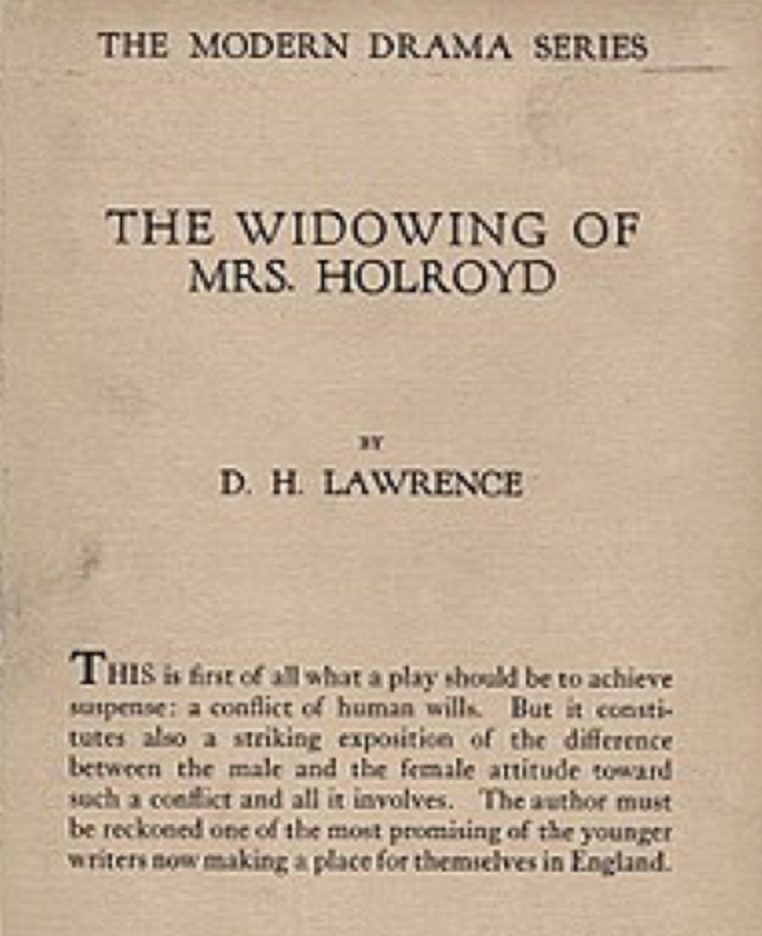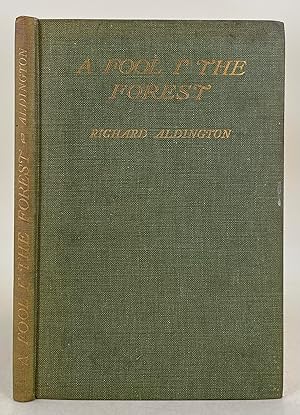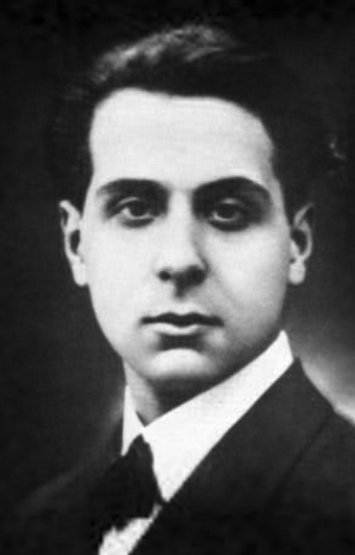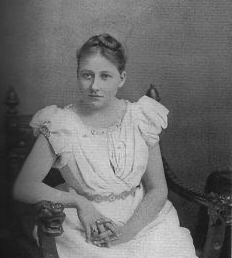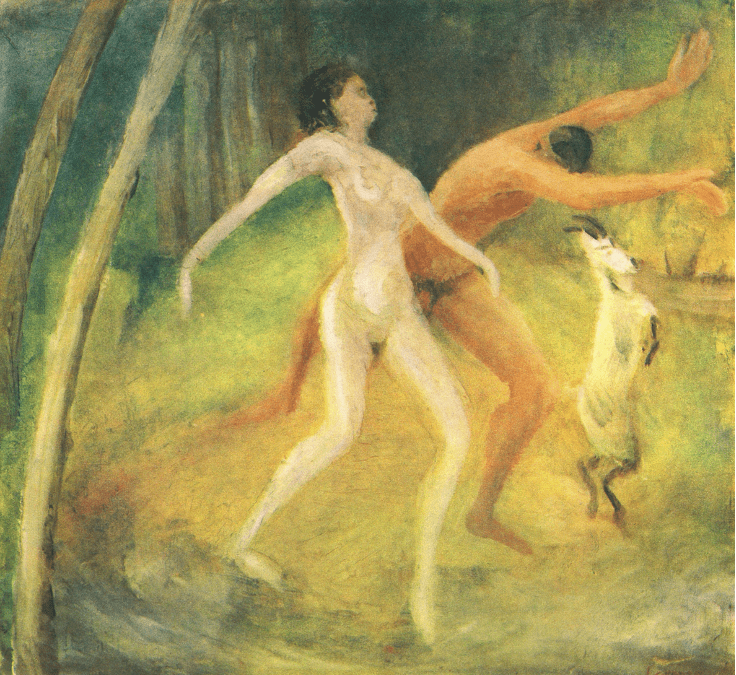Report of the Fourth Meeting of the London D. H. Lawrence Group
The Widowing of Mrs Holroyd: A Play Reading
Friday 13th December 2019
New College of the Humanities, 19 Bedford Square, London, WC1B 3HH
6.30-8.50 pm
ATTENDERS
Catherine Brown
Patricia Hopewell
Alex Korda
Dudley Nichols
Jane Nichols
Trevor Norris
Anthony Pacitto
Nahla Torbey
Aleksander Vasilkov
[Lawrence wrote The Widowing of Mrs Holroyd, his second play (after A Collier’s Friday Night), by November 1910. Its plot is closely related to that of his earlier story ‘Odour of Chrysanthemums’, which he had finished by December 1909. Having failed to get the play performed (though it was considered by Harley Ganville-Barker), he decided to publish it – but due to a series of accidents this did not happen until April 1914, in the US. A UK edition swiftly followed. It became his first play to be staged, in Los Angeles, in December 1916. Lawrence was not present – as he was not for the other two performances within his lifetime – and it is not known whether he was even aware of the production, which was a success. It was performed for the second time by an amateur dramatic company near Manchester in March 1920, when Catherine Carswell reviewed it. In December 1926 it was performed in London’s Kingsway Theatre, still his only play to have been performed (shortly to be followed by David). George Bernard Shaw admired it, and is supposed to have said: ‘Compared with that, my prose is machine-made lace. You can hear the typewriter in it’. However, it received mixed reviews, and Lawrence himself now found it somewhat jejune and gloomy. In 1961 a British television version of the play kick-started major interest in this, and others of Lawrence’s plays, in that decade.]
We sat in a small circle, in order to evoke the closeness and sociability of miners’ parlours.
In our mutual introductions, Anthony Pacitto noted that that day, 13th December 2019, was the hundredth anniversary of the arrival of Lawrence and Frieda, on foot, at the Italian village of Picinisco, as detailed by Anthony in ‘In Search ofThe Lost Girl’ below.
Everyone participated in the reading, drawing our parts out of a hat. Between Acts we paused to share our impressions. Observation was made of the proleptic parallels between Mrs Holroyd’s situation and that of Frieda Weekley, another mother who – a year and a half after the play was written – was also to meet a younger man who wished her to abandon her husband and elope with him abroad. Lawrence cannot fail to have noted this parallel when revising the play for publication in 1914 after his marriage to Frieda in 1913. It was noted that Jack and Minnie Holroyd’s are substantial parts, and early indications of Lawrence’s talent at creating credible and interesting child characters. Trevor Norris, who read Mr Holroyd, had to leave for another appointment part way through the reading – unintentionally and uncannily just at the time that his character, trapped underground in a rock fall, was being killed. It is not known whether play readings were amongst the activities that would take place at the ‘Thursdays’ of Lady Ottoline Morrell, the Bloomsbury hostess and patroness who lived opposite the College at 44 Bedford Square between 1906 and 1927; Lawrence first visited her there in 1914; but it is possible, and a poignant thought.
We repaired to the Turkish restaurant Tas for a convivial pre-Christmas dinner.
Catherine Brown
In Search of The Lost Girl
Anthony Pacitto
One hundred years ago on this very evening, 13th December 1919, and at the very hour when the London branch of the Lawrence Society are gathering for their Christmas meeting, Lawrence and Frieda are walking the final few yards through an icy starlit night up to a wild little villa in a remote semi-mountain hamlet ‒ part of the village of Picinisco.
That afternoon, they have taken the train from Rome to Cassino where their host, a certain Orazio Cervi, will meet them. In Lawrence’s first post-war novel, The Lost Girl, (1920), he gives a very colourful description of their arrival. It is obviously autobiographical: for Alvina read Frieda, for Ciccio ‒ the dark brooding Italian husband ‒ read Lawrence, and for their host, poor old Orazio, read Pancrazio. The new arrivals get off the train, but their host is nowhere to be seen. Then he appears…“How have I missed you?” he said. “I was on the station when the train came, and I did not see you.” But it was evident he had taken wine (LG 371). [Lawrence merciless and amusing from the start].
They climb onto a packed omnibus which careers off across the valley…High overhead, as the sun went down, was the curious icy radiance of snow mountains… (LG 372). The bus starts to climb through closing-in mountains. They arrive at a wild little village. They must get down from the bus. Low, squalid sort of buildings stood around…The stars were in the sky, the air was icy. People stood darkly, excitedly about, women with an odd, shell-pattern head-dress of goffered line…They were hard-faced mountain women (LG 373). They enter a sort of little inn to have a coffee…It was a hole with an earthen floor and a smell of cats. Three crones were sitting over a low brazier in which charcoal and ashes smouldered (LG 373).
But this is not their final destination. They buy some provisions. Now they must find a cart and driver to take them on. They mounted into a two-wheeled cart…And so, without any light but that of the stars, the cart went spanking and rattling downhill…Down in the darkness into the darkness they rattled, wildly, and without heed […] Over-head she saw the brilliance of Orion. She felt she was quite, quite lost. She had gone out of the world, over the border, into some place of mystery (LG 374-5).
They arrive at another inn. Men in hats and cloaks sat a table playing cards… (LG 376). The cart can go no further. But the journey is still not over. Pancrazio’s silent little brother Giovanni is waiting there with an ass. They load their luggage and provisions on the ass and set off on foot…It was freezing, the mountain highroad was congealed. High stars flashed overhead (LG 377). The bread they have bought falls from the donkey. Ciccio picks it up. Alvina asks him to break some off for her. She is starving. They walk along chewing.
They leave the road and cut through some country path. But now they must cross an icy mountain torrent. Pancrazio, holding his lantern, guides them though the boulders, then across a deeper part on a shaky plank. Meanwhile the ass has refused to cross. Pancrazio, swearing, goes back, and he and Giovanni eventually get the beast across.
“Oh the stupid beast! I could kill him!” cried he.
“Isn’t he used to the water?” said Alvina.
“Yes, he is. But he won’t go except where he thinks he will go. You might kill him before he should go.” (LG 379)
They scramble tiredly up a rocky track, and finally, in the dark, they are on the threshold of the wild little villa. But all is not well.
“Oh!” exclaimed Pancrazio, they have done nothing that I asked them.” He made queer noises of exasperation.
“What?” said Alvina.
“Neither made a fire nor anything…” (LG 379)
Pancrazio opens the door, and by the light of the lantern, leads them into the cold house. Alvina followed him into a stone-floored, wide passage, where stood farm implements, where a litter of straw and beans lay in a corner, and whence rose bare wooden stairs. So much she saw in the glimpse of lantern-light, as Pancrazio pulled the string and entered the kitchen: a dim-walled room with vaulted roof and a great dark, open hearth, fireless: a bare room with a little rough dark furniture: an unswept stone floor: iron-barred windows, rather small, in the deep thickness of the wall, one-half shut with a drab shutter. It was rather like a room on the stage, gloomy, not meant to be lived in (LG 380).
Alvina, despite her tiredness, wants to be positive: “It’s a beautiful room,” she says. But Ciccio is gloomy. Pancrazio makes up the fire and cooks the steaks they have bought. There is little in the way of plates and cutlery. They eat the steaks on their knees sitting on a greasy settle in front of the fire.
And so, here we will leave our wanderers, cold, tired and maybe a little apprehensive, while we ‒ the London Group of the Lawrence Society ‒ sip white wine in a warm beautiful chamber in a fine old mansion on Bedford Sq., anticipating a delicious dinner at a Turkish restaurant later, and meditating the imminent murder of Mrs. Holroyd. (Pace).
[Some mediumistic gift I feel sure Lawrence possessed, so I am tempted to think that while we sat with our glasses of wine, and I felt prompted to say a few words to celebrate the centenary of that night, that Lawrence ‒ sitting on the greasy settle, slicing his steak, bickering a little with Frieda and wondering where on earth he had pitched up ‒ got a sudden vision of us, there in London, meeting in his name, and that he poured an amused vitriolic benediction over us, and wondered whether there was any way we could contact his publisher for him, and ask for an advance on all those royalties he would never receive].
But how did Lawrence and Frieda pitch up at such an unlikely place? In December 1919, on their first visit back to their beloved Italy since before the war, D. H. Lawrence and Frieda ‒ heading south from Florence to Rome and eventually to Capri ‒ make an excursion off the beaten track and into the wild mountains of the Abruzzo. They are going to stay with a certain Orazio Cervi who had been an artist’s model in late Victorian London, sitting for some of the most famous names of the time ‒ Frederick Leighton and William Hamo Thornycroft amongst others. Orazio had now retired back to his native village where he had built himself a handsome little villa, by local standards.
Earlier that same year, Lawrence had met Thornycroft’s daughter, Rosalind Baynes, and he and Frieda had stayed with her at her cottage in Pangbourne. Rosalind, just separating from her husband at the time, wanted to get away somewhere. She must have had fond memories of old Orazio, because the bizarre idea came to her of taking her three children and going to stay with him for a while, anything to put some distance between her and her domestic problems. Unusually for someone of his background, Orazio, it seems, was accepted into certain social circles to some degree. Lawrence, at this time, was planning his escape from England, and Rosalind suggested that on his journey south he might like to go and stay with Orazio and see what it was like. She would follow later. Orazio was contacted. Arrangements were made.
Here is an extract of a letter Lawrence sent to Rosalind soon after their arrival, describing the house…
Presso Orazio Cervi, 16th December 1919 (Lawrence to Rosalind):
… It is a bit staggeringly primitive. You cross a great stony river bed, then an icy river on a plank, then climb unfootable paths, while the ass struggles behind with your luggage. The house contains a rather cave-like kitchen downstairs – the other rooms are a wine-press and wine storing place and corn bin: upstairs are three bedrooms, and a semi-barn for maize-cobs: beds and bare floor…Everything must be cooked gipsy-fashion in the chimney over a wood-fire. The chickens wander in, the ass is tied to the doorpost and makes his droppings on the doorstep, and brays his head off. The natives are ‘in costume’ – brigands with skin sandals and white swathed wrapped legs, women in sort of Swiss bodices and white shirts with full, full sleeves – very handsome – speaking a perfectly unintelligible dialect and no Italian. The village 2 miles away, a sheer scramble – no road whatever……At the moment a terrible commotion, bagpipes under the window, a wild howling kind of ballad, utterly unintelligible – Christmas serenade. It happens everyday now, till Christmas.
I believe you would enjoy it here – but what about the children? They are impossible. There isn’t anything approaching a bath: you’d have to wash them in a big copper boilingpan, in which they cook the pig’s food.”
Lawrence and Frieda didn’t stay long, about ten days, it being too icy-mountainous for his frail health, and one would imagine that such a brief uncomfortable visit would be just a forgotten footnote of literary history, and in a way it is. But from the brooding pagan mountain valleys, the snow and isolation, the pervading sense of fatalism, the coarse hard cunning peasant existence, Lawrence was able to weave together a new version of a novel he had been working on before the war. The result was The Lost Girl (1920), the last chapters of which are set there in the village and at Orazio’s villa.
Rosalind decided not to come. But by the light of Lawrence’s literary imagination her insubstantially permanent place was taken by Alvina ‒ The Lost Girl.
Many years ago I was lucky enough to discover the whereabouts of Oazio’s wild house. I should start by saying that the village on the edge of the Abruzzo where it is situated, and where Lawrence and Frieda spent ten shivery days, is the village my grandfather came from, and although I am a Londoner born and bred, I still kept, and keep to this day, strong ties to that part of the world.
It all started at a boozy lunch in a Rome piazza with a friend of mine from school, and his father, an eminent Shakespeare scholar, who of course was also well-informed about Lawrence stuff. When he heard the name of the village where I was staying in my grandfather’s old house, he immediately popped up with the story of Lawrence’s visit there, and the subsequent writing of The Lost Girl. I had no idea. I poured myself another glass of Frascati.
On my return to the village I asked around. No-one knew about the novel, and of course no-one knew about the house. The Lost Girl had been completely lost to the place that had given her birth. Eventually, after a little digging around, I found the house, or what I was pretty sure was the house, because it was hardly more than an abandoned old farm building. Then I noticed over the door the initials, O. C. 1889 ‒ Orazio Cervi. I pushed open the door, and there it was, stone cold and immortal, word for word, brick for brick, straight out of the book. [I won’t elaborate on this further as it forms part of an idea for my next novel which is currently taking shape].
It took many years more of gestation before I finally decided to write a fictional account of Lawrence and Frieda’s stay in Orazio’s little villa. For anyone interested it is titled – A Sense of Ancient Gods (2018).
Anthony Pacitto
